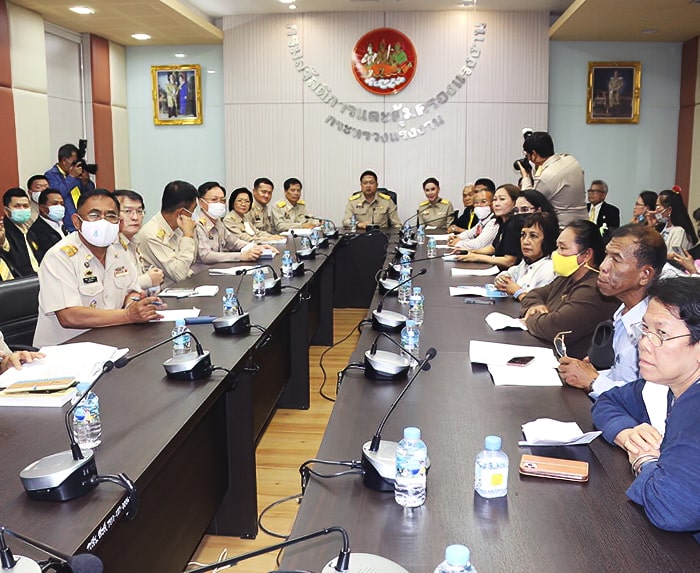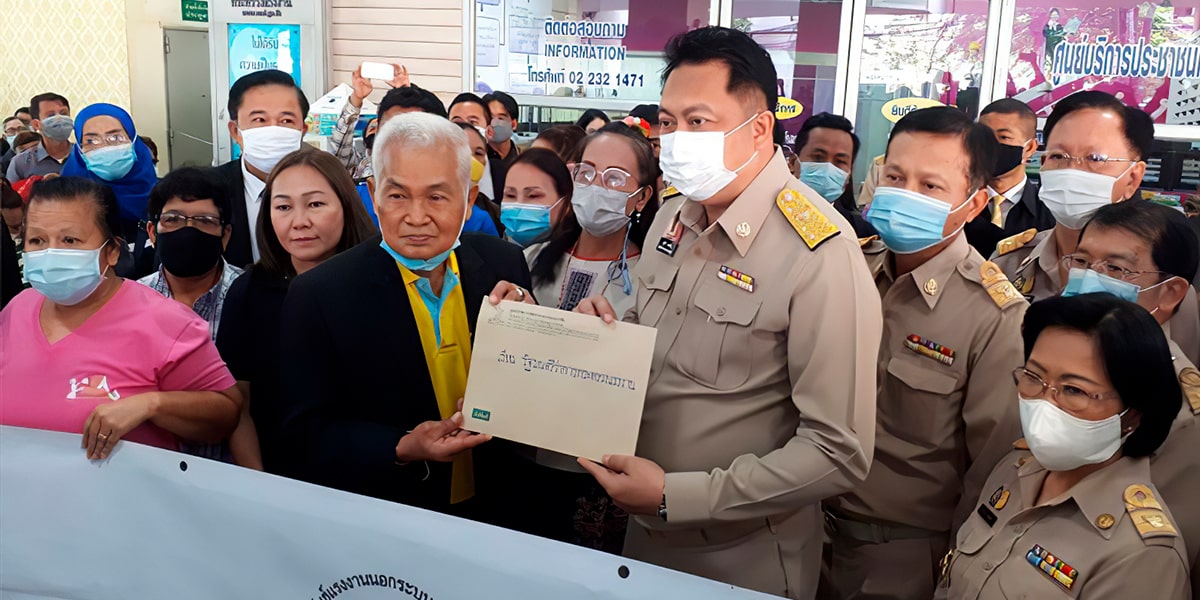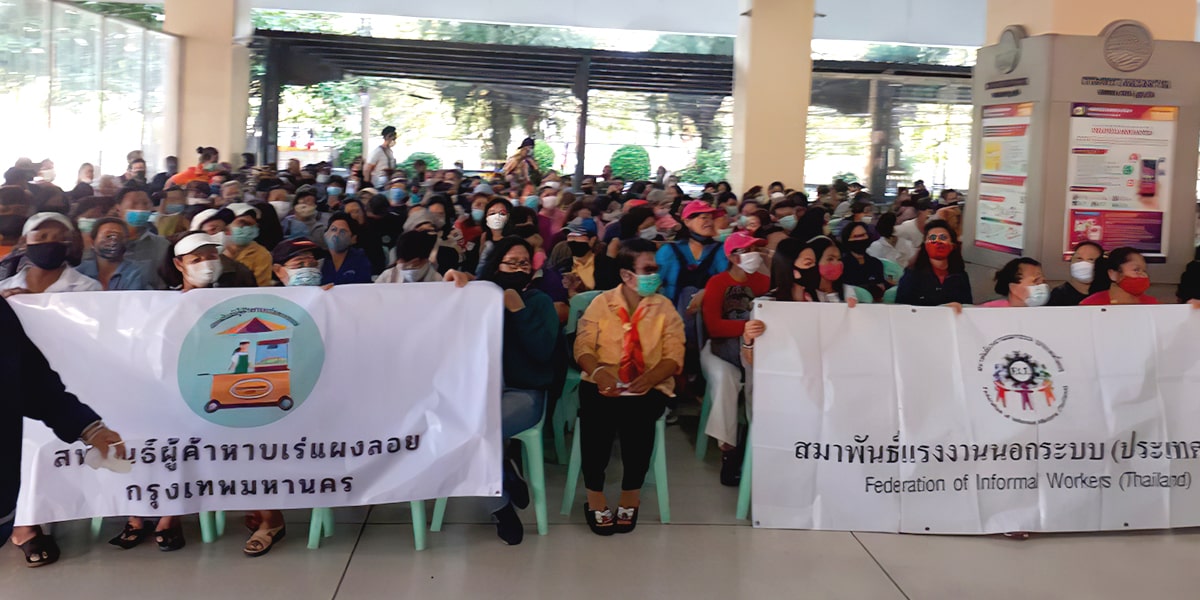On 7 December 2020, HomeNet Thailand Association together with the Informal Workers’ Confederation (Thailand) organized the gathering of more than 700 Informal workers: homebased workers, street vendors, domestic workers, motorcycle taxis, beauticians and massagers in front of the Ministry of Labour. We call the government for the measures for informal workers to recover from the economic and social impact of COVID-19 pandemic.
Our urges to the government as follows:
-
Informal workers need employment and work to fulfill our potential, to live with dignity, and economic independence, we urge the Thai government to provide basic assistance
-
Support a fund for the informal sector occupation promotion. Ensure informal sectors have access to the micro loans.
- Provide 50,000-300,000 Baht interest-free micro loan to individual informal sector, without the requirement for a collateral.
- Provide a working capital grant to registered groups of informal sectors at 100,000-1,000,000 Baht per a group.
-
Review grant criteria and requirement for existing funds, namely the Homeworker Protection Fund:
- Provide individual informal workers with interest-free micro loans at 50,000-300,000 Baht each, without the requirement for a collateral.
- Provide a working capital grant to registered groups of informal sectors at 100,000-1,000,000 Baht per a group.
- Allow informal workers to use public vending spaces such as hawking areas, walking streets, bazaars, open air markets, green markets, and government agency markets.
- Government agencies and Local Administrative Organizations should establish a workfare program to recruit workers for public services, namely: carers for bed-ridden patients/the elderly in a community, or fixers to help with home-fixing and repairing for vulnerable populations, etc.
- Ensure that informal workers will have at least ten days minimum wages employment guarantees per month.
- Ensure that the formal workers severely affected by COVID, especially in Small and Medium Enterprises (SMEs) receive a form of wage subsidy (i.e. wage co-payment) to maintain employment, therefore they will not become informal workers.
- Allocate at least 30% informal sector quotas in public procurement projects. Quotas should be given especially to the informal sector affected by COVID-19.
- Provide budget informal worker groups or cooperatives to increase competitiveness and invest a platform to support the sales and distribution of goods and services manufactured by informal sector.
- Deploy available government's economic stimuli, namely "Rao Tiew Duai Gan" (We Travel Together) campaign and “Khon La Khrueng” (Let's Go Halves) shopping campaign cover services or products made by informal sector.
-
Support a fund for the informal sector occupation promotion. Ensure informal sectors have access to the micro loans.
-
The informal sector urge the government to improve our skills to pursue a sustainable career in the new post-COVID labor markets.
- Organize re-skilling or up-skilling training activities for existing informal sector manufacturers, namely: child/elder/people with disability cares.
- Organize new skill development activities, such as using the internet or online platform and e-commerce skills for goods or services.
- Provide skill development activities free of charges. Also, there should be subsidies for meals, commuting, and wage subsidy, at least equal to the minimum wage, for lack of income during the training activities. After training activities, the government should provide marketing or distribution platforms or secure employment or jobs for trainees.
-
The Informal sector urges the government to establish an equal and inclusive social protection system, ensuring the informal sector to survive the COVID-19 pandemic, and that we can bounce back better in the future. We urge the government to:
- Provide unemployment benefits to the article 40 social security insurers (self-contribute informal workers).
- Review and revise the social security benefits in every social security category. Social security insurers must receive the same benefits. The Social Security Office must be reformed to be a genuine independent body that shall be administered by insurer representatives from every category.
-
Ensure effective implementation by including Informal worker representatives from the Informal Workers Confederation (Thailand), the academic, civil society organizations should be consulted, participate, and monitor every aspect of the activities conducted as a result of these recommendations.
After proposing the demand to the Minister of Labour and 3 hours of meeting, we found positive responses. These are some examples:
- The Minister of Labour will organize the meeting of involved government agencies to discuss on micro loans for informal workers.
- The Minister of Labour will organize the meeting with the Bangkok Metropolitan Administrator to discuss on using the public space of street vendors.
- 30% informal sector quotas in public procurement projects. Quotas should be given especially to the informal sector affected by COVID-19 are agreed.
- For closer communication, LINE group of informal workers leaders, the Minister and other key persons of the Ministry of Labour are established, and the meeting of this group will be organized every month.
- The sub-committee of the Social Security Scheme to revise the benefits of article 40 social security insurers (self-contribute informal workers) will be formed with the participation of the informal workers’ representatives.
After this, HomeNet Thailand Association and the Informal Workers’ Confederation (Thailand) will follow up all these agreements and push them to implement.





